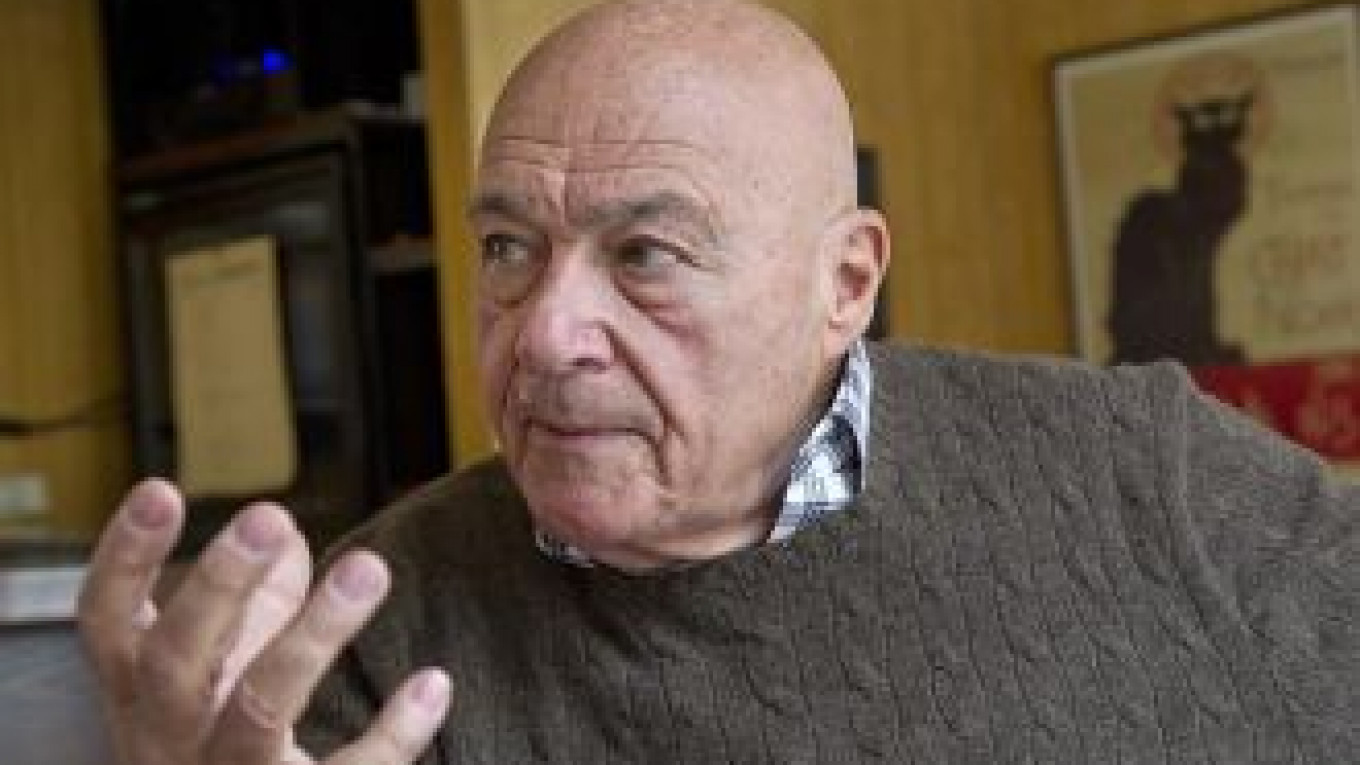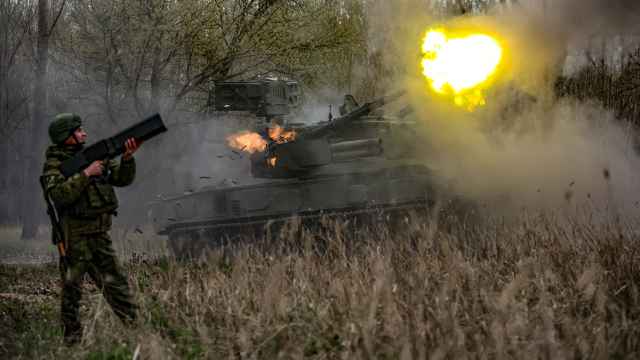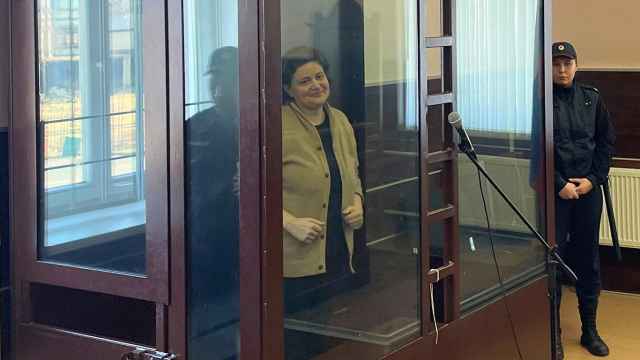For many Americans over 40, legendary television journalist Vladimir Pozner was the face of the Soviet Union.
Throughout the 1980s, Pozner was best known in the West for his frequent appearances via satellite on Ted Koppel's "Nightline" program, as well as the co-host of U.S.-Soviet "space-bridge" broadcasts with U.S. talk show host Phil Donahue.
Even if viewers didn't always agree with Pozner's positions and his defense of Soviet policies, it was hard not to be impressed by his articulate speech, intelligence and wit.
Education
1958 — Moscow State University, degree in biology
Work experience
2008 - present — host of "Pozner" interview program on Channel One
2000-2008 — host of "Vremena" political talk show on Channel One
1997-2000 — host of radio show "Let's Discuss This" in Moscow
1991-1997 — co-host of "Pozner/ Donahue" on CNBC
1970-1989 — host of radio programs on Golos Moskvy; throughout the 1980s, Pozner was a frequent guest of ABC's "Nightline" program with Ted Koppel and "The Phil Donahue Show," where he co-hosted the U.S.-Soviet "space-bridge" broadcasts.
1967-1970 — senior editor of Sputnik magazine in Moscow
1961-1967 — senior editor of Soviet Life magazine in Moscow
Favorite book: "The Three Musketeers," by Alexandre Dumas (1844)
Favorite movie pick: "One Flew Over the Cuckoo's Nest," directed by Milos Forman (1975)
Reading now: rereading "The Stranger" by Albert Camus (1942)
Weekend getaway destination: Paris
Pozner was born in France in 1934, fled to the U.S. in 1940 after the Nazi invasion of France, and was raised in Manhattan until 1949, when the rise of McCarthyism created problems for his Russian-born father. He then lived in East Germany for three years before moving to Moscow, where he completed his university degree. After graduating, Pozner spent 30 years working as a Soviet print, radio and television journalist until the Soviet collapse in 1991. In the subsequent two decades, he has been a prominent television talk show host in both the U.S. and Russia.
On Monday, Pozner turned 79, but he is in excellent physical shape. What's more, his trademark smile still warms the heart as it did 40 years ago, and his intelligent, blue eyes haven't lost their luster. For the millions of Pozner fans who religiously watch his weekly interview program "Pozner" on Channel One, they can rest assured that Pozner shows no signs of retiring any time soon.
At his stylish French brasserie called Geraldine, which is named after his French mother and located just off of Moscow's exclusive Ostozhenka street, Pozner sat down with The Moscow Times and shared his views on the rise of anti-Americanism, the Russian work ethic, the lack of racial tolerance in the country, patriotism, his Jewish background and the future of democracy in Russia.
This interview has been edited for length and clarity.
Q: Many in the West are surprised that the Kremlin's anti-U.S. propaganda campaign still works so well on Russians 20 years after the Soviet collapse. Why is the level of anti-Americanism still so high in Russia?
A: The level of anti-Americanism is probably higher now under President Vladimir Putin than it was during the Soviet Union. Soviet anti-Americanism was mostly government-induced, while the current anti-Americanism is more grassroots in nature, and there are several reasons for this.
First, after the Soviet collapse, the U.S. didn't do enough to build better relations with the Russian government and the people. One of Washington's biggest mistakes was not developing a kind of Marshall Plan for Russia in the early 1990s. Had that happened, I am convinced that we would be living in a completely different country today.
The other reason is that the U.S. didn't hide its joy at winning the Cold War, at times relishing its victory and reminding Russia in many different ways that it is no longer a superpower. The U.S. and NATO bombing of Yugoslavia in 1999 was a key moment, sparking sharp anti-U.S. sentiment in Russia. This anti-Americanism continued during the years that George W. Bush was president and continues to this day.
Q: But don't most Russians have many more important things to worry about on a daily basis than the United States?
A: Over the past five years, I have traveled to 50 or 60 Russian cities, both small and large. I have met with people and discussed this issue. What I have found is that Russians are still very much envious of Americans. Even if they have never been to the U.S. or never even met an American, they still know that Americans live much better on the whole than Russians. In addition, Russians are a proud people and have always considered themselves a great nation. They are still stung by the defeat in the Cold War and the loss of the country's superpower status.
Q: Why don't Russians blame the Soviet Union and its flawed leadership and policies for that?
A: It is very difficult to do that because they would have to blame themselves for past mistakes. Very few countries are able to do this, including the U.S. and Japan. Psychologically, it is more comforting to blame others. Perhaps the only country that was able to take a firm position on its guilt was Germany, and this was only because they were occupied after World War II and had to come to terms with their criminal past, clearly saying to the whole world, "We were wrong."
Keep in mind that Russia very much remains a Soviet country in terms of its mentality. The people who run the country were born, bred and educated in the Soviet Union. They were all Komsomol and Communist Party members at one point. To this day, it is difficult for them to change their Soviet mentality and admit that the Soviet Union was responsible for the collapse of the empire, as it is difficult for them to admit the mistakes they have made as leaders in post-Soviet Russia. Incidentally, this Soviet mentality among the country's leaders is one reason why Russia is moving so slowly toward democracy.
Q: How much of anti-Americanism in Russia is manufactured or contrived by the Kremlin?
A: I don't think the Kremlin has a specific interest in cultivating anti-Americanism. Putin understands that Russia needs the U.S. as a partner and has shown this many times. At the same time, however, Putin has real suspicions about U.S. intentions, many of which are justified. He believes that there is a powerful group within the U.S. political establishment that would prefer to see Russia on its knees.
Actually, there is far less anti-Americanism on state-controlled Russian television today than there was during the Soviet period, yet the level of grassroots anti-Americanism is higher. I believe that the U.S. is largely responsible for this. The U.S. made a fundamental mistake in its policy toward Russia — and toward many other countries for that matter — in believing that it could export democracy in 20 years, or even less. Building democracy is a long process that sometimes takes centuries. I'm not saying that the U.S. shouldn't criticize Russia when it deserves it, but Washington should have more patience when judging Russia.
U.S. double standards also play a large role in fueling anti-Americanism in Russia. For example, there is much more democracy in Russia than in China. Yet while you rarely hear U.S. criticism of China, Russia is often presented in the U.S. media and in government circles as being anti-democratic and going back to Soviet authoritarianism. The general opinion among Russians is: "C'mon, guys. Give us a break!" And the recent U.S. Magnitsky Act, which singled out Russia for its human rights record among all nations of the world, made Russians' already negative attitudes toward U.S. double standards even worse.
Q: How does Russian patriotism differ from U.S. or French patriotism?
A: In the U.S., every major league football or baseball game starts with the crowd standing up, putting their hands on their hearts and singing "The Star Spangled Banner." In France, that would be considered crass. The French are still very patriotic, but they are a bit quieter about it; as the saying goes: "The French don't think they are the best in the world. They know it."
Russian patriotism is somewhat closer to French patriotism in this respect, but at the same time Russians have more doubt about their country's greatness as a global player because of the Soviet collapse. As a result, Russian patriotism tends to be more aggressive in nature than U.S. or French patriotism.
Q: In your book "Parting With Illusions," you criticize Russians for their general lack of tolerance. You write that even the so-called intelligentsia don't see anything wrong with saying something openly racist like, "I can't stand chyornikh," a pejorative term in Russian for people from the North Caucasus and Central Asia. What should the government do to address the problem of widespread racial intolerance in Russian society?
A: The lack of political correctness and tolerance in Russia is a huge problem, and yet the government has made no effort to address this issue or to discuss the problem in schools, in the media and in society as a whole. Its policy has basically been to ignore racial intolerance, which means that it festers and only gets worse. This may be Russia's greatest problem because it exacerbates the sharp divisions in Russian society. The Russian government needs to understand that racial and ethnic intolerance is a dangerous disease that needs to be treated. Otherwise, there could be a real social explosion.
Q: When you interviewed television personality Ivan Urgant during one of your recent "Pozner" television shows, you asked him a question about his Jewish background that made him visibly uncomfortable. Yet it was the same question that Phil Donahue asked you 25 years ago on television, which also made you visibly uncomfortable, as you described in your book. Do you think your question to Urgant was politically correct?
A: Actually, it wasn't my question to Urgant but one from a viewer. But I felt it was an important question to ask because you have to come to terms with these issues. Yes, Phil Donahue's question made me uncomfortable, but I am glad in the end that he asked it because it helped me get rid of the Soviet complex I had of not wanting to be Jewish.
Yes, I squirmed when Donahue asked me the question about my Jewish background, but because I went through the process I don't squirm any more. Today, I would answer Phil or anyone else calmly by saying: "Pozner is, indeed, a Jewish name, and I am perfectly happy knowing that I came from a Jewish family from my father's side. At the same time, I am an atheist and am not part of the Jewish culture or religion in any way. The only time I do feel Jewish, however, is when I encounter or hear about anti-Semitism. To any anti-Semite, I would be the first person to say to him, 'I am Jewish and proud of it.'"
Q: How would you describe the Russian work ethic?
A: I know of no other country where the word for work, работа, is derived from the word slave, or раб. I know of no other country where one of the most popular fairy tales is based on a loafer who lies around all day at home not doing a damn thing and then gets lucky in life because he catches a gold fish.
In addition, the bad work ethic has a lot do with Russia's Orthodox religion, which is more restricted, closed and less tolerant than other Christian dominations — and one that to a larger extent inculcates the notion that the individual is nothing. If you look at the most prosperous countries in the world, they are largely Protestant. Catholic-majority countries come in second, while Orthodox countries like Russia trail by a large margin.
This doesn't mean that Russians don't work hard. They do, particularly in difficult times, and they have shown many times that they can pull themselves up by their bootstraps, when necessary.
Q: What are you proud of in Russia today?
A: I can't say I am particularly proud about anything. There are certain people whom I respect for their bravery, when they stand up for what they believe in, defend their principles against the powers that be. At the same time, however, what I find painful is the apathy that dominates many Russians.
There is another thing I find distasteful: Many Russians from so-called higher society who say, "I just got back from vacation and thank goodness there were no Russians there." I say to myself, "Well, who are you?" Can you imagine an American or Frenchmen saying, "Thank goodness there were no Americans or French where I vacationed"? This is a strange mixture of an inferiority complex and chauvinism.
Q: Many believe that Russia is doomed to be stuck in a permanent historical cycle of autocracy. Do you see any way out of that vicious circle?
A: Certainly, a strong leader has always been a part of Russian history. Most Russians support a strong government and want a strong leader who can represent the country well on the global arena. This is one reason why Putin is still quite popular, even after being in power for so many years. Once Putin does step down, however, I could see someone like Mikhail Prokhorov becoming president. He would be a strong leader but not necessarily autocratic.
Q: So are you optimistic that Russia will eventually become more democratic?
I have no doubt that Russia will become more democratic, and it is already moving in that direction. Look at all the Russians who regularly speak out in harsh terms against Putin, the government and the Duma. What's more, tens of thousands of Russians have participated in street demonstrations over the past year. The fear factor, which used to be a central component of the Soviet Union and the glue that held that country together, is clearly not present in Russia today.
This movement toward democracy will surely continue. In another 20 years, there will be a new generation that will have a different mentality, a different outlook on life. This country will change in a democratic direction because as the people change, so will the government, which will be made up of new people who never grew up in the Soviet Union and who were never members of the Communist Party or the KGB.
Contact the author at m.bohm@imedia.ru
Related articles:
A Message from The Moscow Times:
Dear readers,
We are facing unprecedented challenges. Russia's Prosecutor General's Office has designated The Moscow Times as an "undesirable" organization, criminalizing our work and putting our staff at risk of prosecution. This follows our earlier unjust labeling as a "foreign agent."
These actions are direct attempts to silence independent journalism in Russia. The authorities claim our work "discredits the decisions of the Russian leadership." We see things differently: we strive to provide accurate, unbiased reporting on Russia.
We, the journalists of The Moscow Times, refuse to be silenced. But to continue our work, we need your help.
Your support, no matter how small, makes a world of difference. If you can, please support us monthly starting from just $2. It's quick to set up, and every contribution makes a significant impact.
By supporting The Moscow Times, you're defending open, independent journalism in the face of repression. Thank you for standing with us.
Remind me later.






